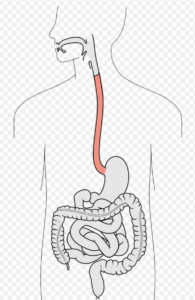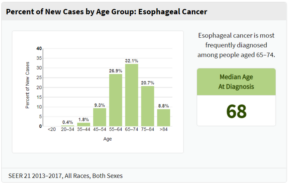Does food seem to feel stuck in your chest lately?
Esophageal cancer causes food to get stuck or feel like it’s “sticking” in the esophagus.
As the tumor grows, it makes it increasingly difficult for food to get past that point after one swallows.
Many people do experience a “stuck food feeling” in their chest, as well as in their throat.
The esophagus, as you might already know, is the so-called food pipe that begins at the throat (upper esophageal sphincter) and ends at the stomach (lower esophageal sphincter).

Olek Remesz,wiki-pl,Orem, commons
A malignant tumor can arise at any point along the esophagus.
At first, a person won’t feel anything abnormal, since a small tumor will still allow room for food to easily get past and into the stomach.
But at some point, as the tumor gets bigger, there will be problems with food getting past this point.
Dysphagia and a Stuck Food Feeling in the Chest
When a person with esophageal cancer – that’s beginning to cause an obstruction – swallows food, they will experience symptoms.
The earliest symptom is almost always difficulty with swallowing.
“This is exactly the meaning of dysphagia, i.e., difficulty swallowing — keeping in mind that a swallow isn’t complete until food reaches the stomach,” says Alex Little, MD, a thoracic surgeon with a special interest in esophageal and lung cancer.
In other words, a person may have no problem clearing their mouth of food, in that the food easily goes down their throat.
But the mechanics of swallowing are not complete at this point, according to physicians.
The process continues until the food or beverage has reached the stomach at the end of the esophagus.
If there’s any difficulty along this path, it’s considered to be “trouble swallowing,” or dysphagia.
“The ‘stuck’ feeling ranges in severity from food permanently lodging to a mild sensation as the food passes,” says Dr. Little.
So in the early course of esophageal cancer symptoms, a person will begin to experience issues with swallowing or getting food down.
The food gets down, but not without the individual feeling something abnormal – which is usually described as “food gets stuck,” “food feels stuck,” or “food sticks in my chest.”
It can also be felt as something getting trapped in the throat, or a lump feeling in the throat after swallowing food.

Freepik
As the tumor grows larger, the patient will begin experiencing regurgitation: just-swallowed food coming back up – because it has no place to go due to complete or near-complete obstruction by the tumor.
At this point the patient is suffering from distress. With complete blockage, even water will come back up.
The regurgitated contents will be the actual food.
This symptom will not come out of the blue in a healthy person. Rather, there will have been a progressing issue (over several weeks) with eating that will culminate in this regurgitation.
Switching to Softer Foods to Compensate

People with esophageal cancer will invariably start switching to softer foods, which will more easily get past the tumor.
When they do this, it may seem that any “trouble swallowing” or a feeling of food getting stuck in the chest has disappeared.
This can deceive the patient into believing that perhaps mental stress was the cause all along, or some other temporary benign issue.
However, the malignant mass will continue getting bigger, and eventually, the symptoms will return despite adherence to a soft food diet.
Is esophageal cancer the most likely cause of a stuck food feeling?
The good news is that this is NOT the most likely cause. Benign differential diagnoses include the following (no particular order):
• GERD: gastroesophageal reflux disease. Suggestive symptoms: burning in the chest when or after eating; burning in throat; excessive burping.
• Esophageal stricture (narrowing) or scar tissue from GERD
• Hiatal hernia
• Infection
• Ulcer. Suggestive symptom: blood in the stools.
• Anxiety or stress. Suggestive symptom: Any stuck feeling comes and goes rather than is always there; does not get worse over time.
Esophageal cancer is 4:1 more common in men than in women. Between 18,000 and 19,000 cases are diagnosed every year in the U.S.
Smoking and drinking are strong risk factors. So is chronically untreated GERD. See the incidence chart below.

But don’t let your guard down now that you know that the “stuck feeling” is far more likely to have a benign cause.
First off, a hiatal hernia can be very serious if it’s big.
Secondly, an ulcer needs immediate treatment.
Third, chronic GERD needs prompt treatment so that it doesn’t lead to precancerous changes in the esophagus.
If a stuck food feeling in your chest or throat persists for longer than a few weeks, you need to see your doctor.

Freepik.com, peoplecreations
Dr. Little explains, “I would tell people (and primary care physicians since they are usually the first to see patients) that any difficulty swallowing, of any extent, should be evaluated starting with a barium contrast upper GI X-ray.
“If that non-invasive study is normal, the patient can be reassured. If abnormal, the next step is endoscopy.”
However, Dr. Little also explains that it’s possible for a barium contrast upper GI X-ray to miss a malignant tumor.
 Alex Little, MD, trained in general and thoracic surgery at the Johns Hopkins University School of Medicine; has been active in national thoracic surgical societies as a speaker and participant, and served as president of the American College of Chest Physicians. He’s the author of “Cracking Chests: How Thoracic Surgery Got from Rocks to Sticks,” available on Amazon.
Alex Little, MD, trained in general and thoracic surgery at the Johns Hopkins University School of Medicine; has been active in national thoracic surgical societies as a speaker and participant, and served as president of the American College of Chest Physicians. He’s the author of “Cracking Chests: How Thoracic Surgery Got from Rocks to Sticks,” available on Amazon.
 Lorra Garrick has been covering medical, fitness and cybersecurity topics for many years, having written thousands of articles for print magazines and websites, including as a ghostwriter. She’s also a former ACE-certified personal trainer.
Lorra Garrick has been covering medical, fitness and cybersecurity topics for many years, having written thousands of articles for print magazines and websites, including as a ghostwriter. She’s also a former ACE-certified personal trainer.
.



























